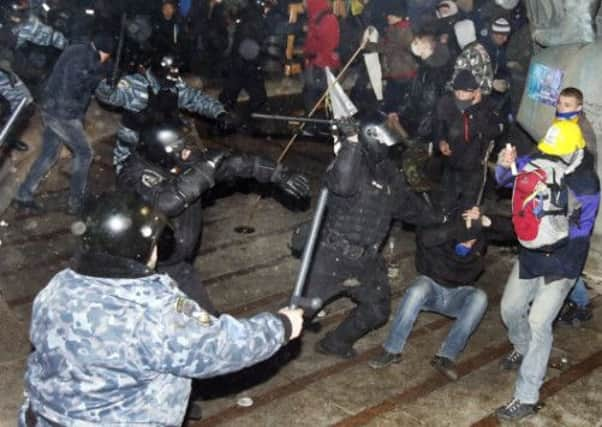Ukraine: Police attack Kiev protest camp


About 10,000 demonstrators were driven out of Independence Square, Kiev, early yesterday as police in riot gear moved in. Many protesters were beaten by truncheon-wielding police.
There were also reports that tear gas was used as demonstrators railed against president Viktor Yanukovich’s decision not to sign an association agreement with the EU, which many had hoped would open up Ukraine’s borders to trade and travel.
Advertisement
Hide AdAdvertisement
Hide AdIn the early morning action, helmeted police carrying white shields stormed an encampment of protesters in the square, as they sang songs and warmed themselves by campfires. Officers took 35 demonstrators into custody and drove back others to another square outside a monastery, where they took shelter in its cathedral.
TV footage showed police beating one woman on the legs and kicking men on the ground. Some protesters were said to be bleeding from their heads and arms after the clash.
Tension had been building since Friday, when Yanukovich snubbed the signing of the pact with EU leaders at a summit in Lithuania, going back on a pledge to work toward integrating his former Soviet republic into the European mainstream.
Pro-EU protesters in Kiev said they had since formed a “national resistance” headquarters, which would be followed by a nationwide strike. A major rally is expected to take place today.
“We have made a joint decision to form a national resistance task force and have begun preparing for an all-Ukrainian national strike,” said former economy minister Arseniy Yatsenyuk.
“Our demands are the resignation [of interior minister Vitali] Zakharchenko, an investigation of his actions and his trial, the resignation of the government and the president and early presidential and parliamentary polls.”
He added: “Ukraine has woken up in a different state after Yanukovich refused to sign in Vilnius. It is no longer Ukraine. It’s closer to Belarus.” Belarus, which borders Ukraine, has been under one-man rule since 1996.
Former Ukraine prime minister Yulia Tymoshenko, who lost to Yanukovich in the 2009 elections and was subsequently jailed for abuse of office (a case that was widely criticised in the West), has urged people to overthrow the government.
Advertisement
Hide AdAdvertisement
Hide AdIn a message read by her daughter, Tymoshenko urged Ukrainians: “Fly, drive, walk to Kiev from all parts of Ukraine, but gather everyone on 1 December.”
“Each of you have to come out and express your own position on what kind of country you want to live in – a totalitarian, police-controlled country where your children will be beaten up, or in a European country,” said Vitaly Klitschko, a world heavyweight boxing champion and leader of the opposition Udar party.
Protesters condemned the police over yesterday’s protest. In 2004, tens of thousands of people came to the square every night, where they demonstrated peacefully for years in the Orange Revolution, which eventually led to the annulment of the results of a presidential election.
“It was horrible. We were holding a peaceful demonstration and they attacked us,” protester Lada Tromada said. “They threw us off like pieces of rubbish.”
“By my count we are talking of tens of people, perhaps hundreds, who were cruelly beaten,” said opposition deputy Andriy Shevchenko. “It was absolute savagery.”
Prime minister Mykola Azarov said yesterday’s incident would be “fully investigated”. “The information from different sides which I have does not allow firm conclusions about who is responsible for this provocation,” he said.
Many western governments, including the United States, have condemned the violence used against the protesters.
“We urge the government of Ukraine to respect the rights of civil society and the principles of freedom and speech and freedom of assembly,” said a US embassy statement.
Advertisement
Hide AdAdvertisement
Hide AdYanukovich’s U-turn over the EU pact came as he claimed that Ukraine could not afford to sacrifice trade with Russia, which regards Ukraine as historically within its orbit and has tried to block the deal by banning some Ukrainian imports and threatening more trade sanctions. Yankovich has said he will build stronger ties with Moscow.
At the summit, in Vilnius, EU leaders had warned they would not tolerate Russian interference in relations with former Soviet nations such as Ukraine, as well as Moldova and Georgia, which did sign agreements on Friday.
Euro deal: Russia prevails
Ukraine’s president, Viktor Yanukovich, said ten days ago he would suspend preparations for the association agreement with the European Union, angering Ukrainian pro-EU campaigners.
The U-turn came following talks with Russia, which vehemently opposes the idea. Pro-EU campaigners believe such a deal would open Ukraine’s borders to western goods and lay the foundations for easing travel restrictions. The prospect of an EU pact appears to have had widespread support among the population of 45 million. But Russian intransigence meant Yanukovich had to weigh up whether to forge ahead and risk jeopardising trade links with his long-standing trading partner, or snub the EU and move closer to Russia. A 2009 dispute between Kiev and Moscow on gas prices resulted in a three-week cut-off of gas to Ukraine. Yankovich decided to rebuild links with Russia.
The EU agreement was due to have been signed on Friday at a summit in the Lithuanian capital, Vilnius. At the summit, EU leaders warned they would not tolerate Russian interference in EU relations with former Soviet republics. Provisional accords were signed with both Georgia and Moldova, part of a four-year-old “Eastern Partnership” programme, aimed at providing a forum for discussion with six former Soviet republics by offering deeper trade and political ties in return for economic and political reforms.
German chancellor Angela Merkel said the door would always remain open for Ukraine. However, EU authorities will now have to decide how to engage with Ukraine following the violent crackdown on the peaceful protesters in Kiev.